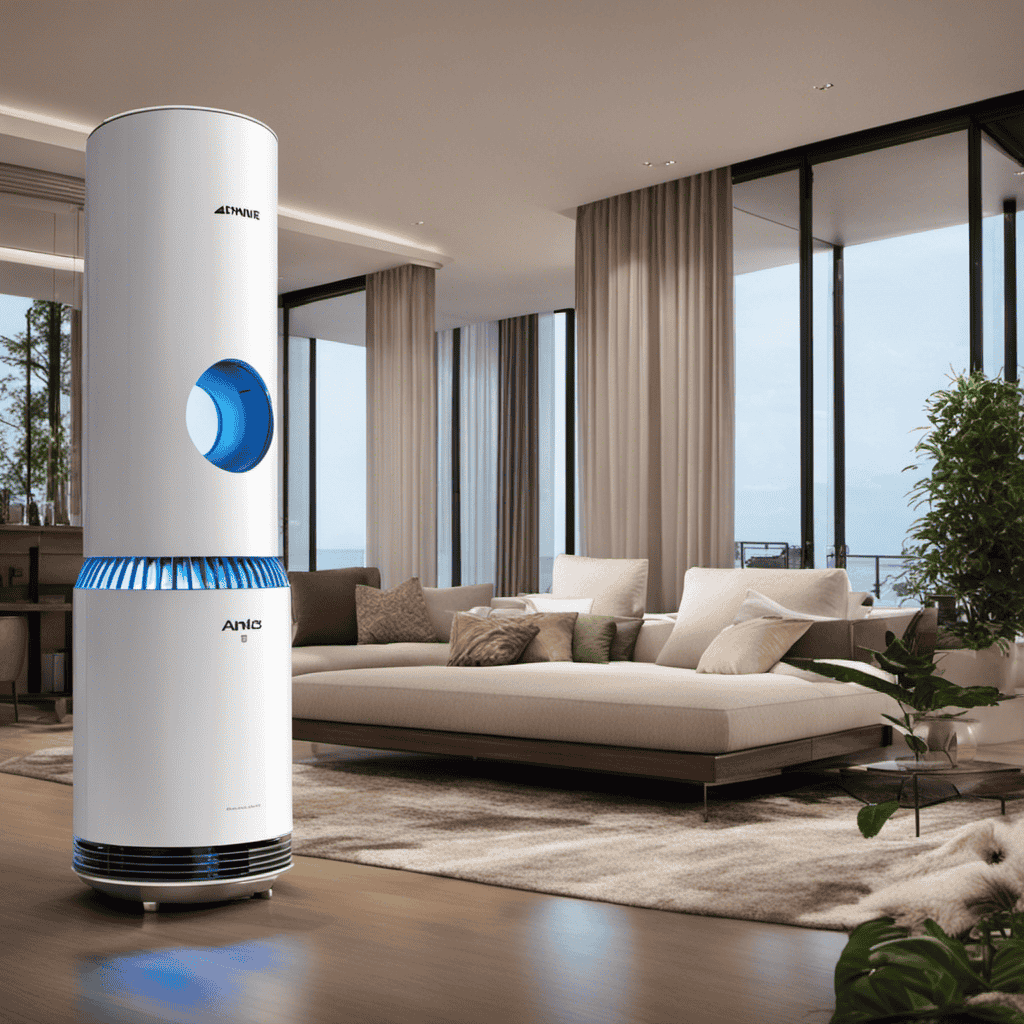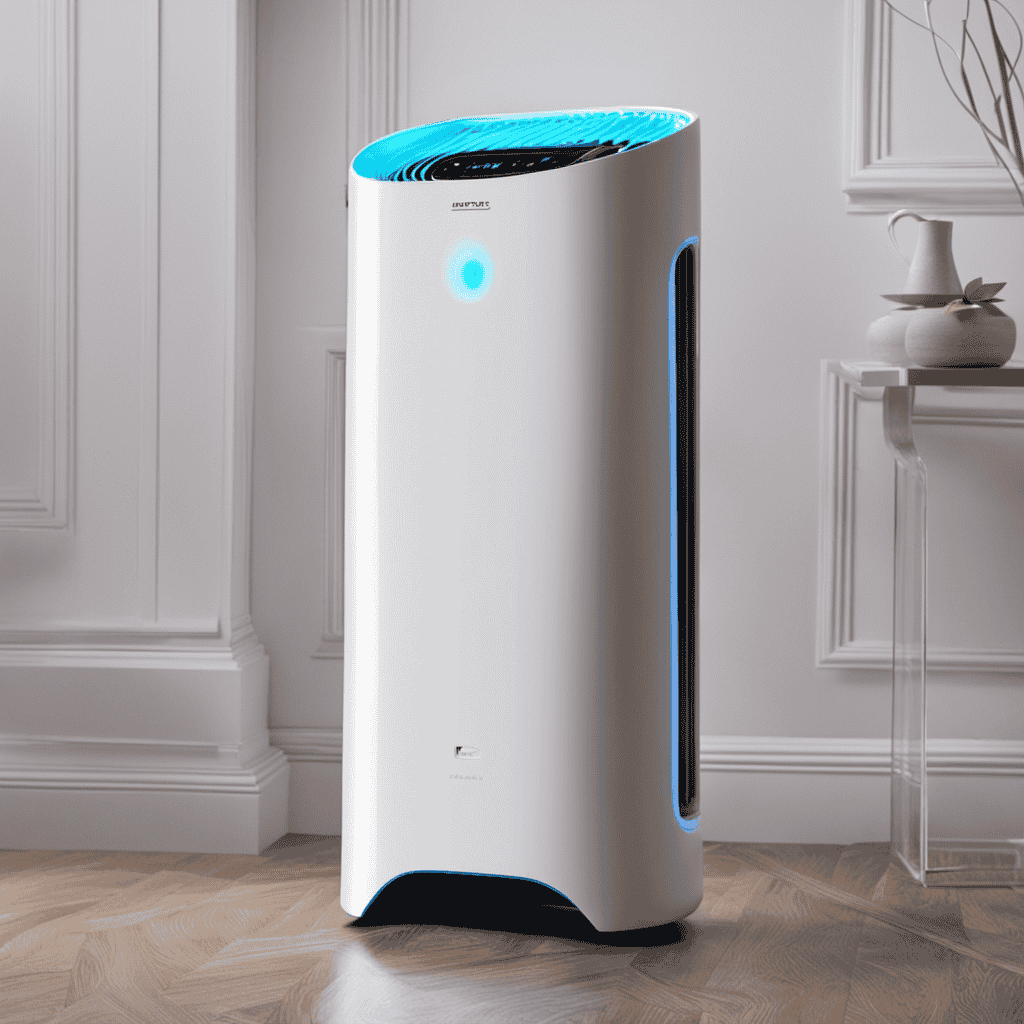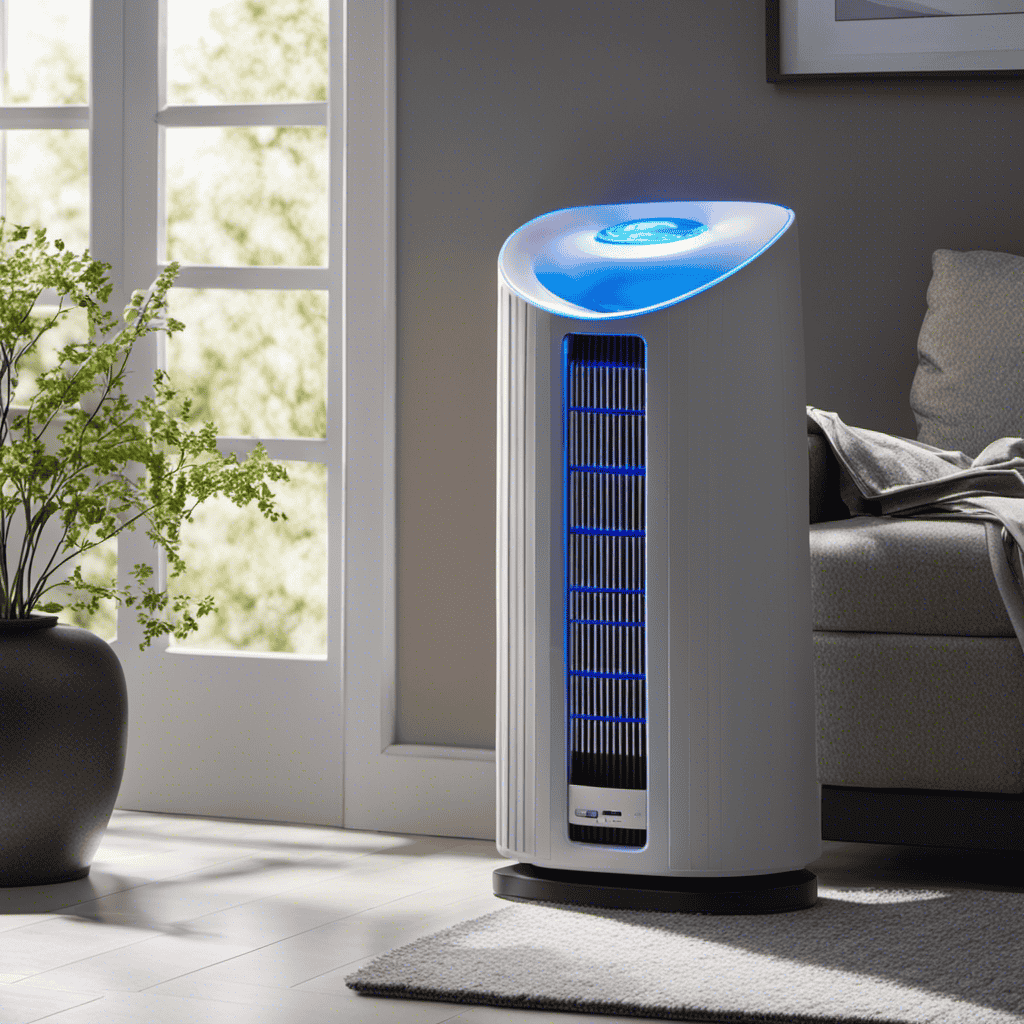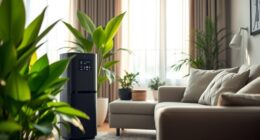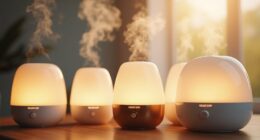Have you ever questioned the meaning behind the mysterious ‘anion’ setting on your air purifier? Allow me to clarify this for you.
Anions, in simple terms, are negatively charged particles that are known to have a positive impact on air quality.
In this article, we’ll delve into the science behind anions and how they work to improve indoor air.
Get ready to uncover the secrets of anions and discover the numerous benefits they bring to your air purifier.
Key Takeaways
- Anions are negatively charged particles that remove pollutants from the air.
- They attract and neutralize positively charged particles like dust, pollen, and pet dander.
- Anions bind to pollutants, creating larger particles that are easier to filter out.
- Anions are effective in improving indoor air quality.
The Function of Anions in Air Purifiers
Anions are negatively charged particles that help to remove pollutants from the air in air purifiers. These tiny particles are effective in improving air quality due to their unique properties.
One of the benefits of using anions in air purifiers is their ability to attract and neutralize positively charged particles, such as dust, pollen, and pet dander. When anions come into contact with these pollutants, they bind to them and create larger particles that are easier to filter out.
This process helps to reduce the number of harmful particles in the air and can be especially beneficial for individuals with allergies or respiratory conditions. Studies have shown the effectiveness of anions in improving indoor air quality, making them a valuable component of air purifiers.
Understanding Anions and Their Effects on Air Quality
Using an air purifier can help improve air quality by releasing negatively charged particles called anions.
These anions have been the subject of extensive research, and the findings suggest that they can have various effects on our physical and mental well-being.
When inhaled, anions can help to remove pollutants and allergens from the air, reducing the risk of respiratory issues and allergies.
Additionally, anion research findings have shown that these particles can also have a positive impact on our mental health.
Anions are believed to increase serotonin levels in the brain, which can improve mood, reduce stress, and enhance overall mental well-being.
While more research is needed to fully understand the mechanisms behind these effects, incorporating an air purifier that releases anions into your living space could potentially have significant benefits for your health.
How Anions Work to Improve Indoor Air
I’ve conducted extensive research on the benefits of anions and negative ion generators, and the results are quite remarkable.
Anions, or negative ions, are known to have several positive effects on air quality and overall well-being. Negative ion generators, which release these beneficial ions into the air, have been found to reduce airborne pollutants, neutralize harmful bacteria and viruses, and even improve mood and mental clarity.
Benefits of Anions
To experience the benefits of anions, you’ll notice improved air quality and a fresher environment in your home. Anions, also known as negative ions, are molecules that have gained an extra electron. They are naturally found in nature, especially in places like waterfalls, forests, and beaches. Anion technology is used in air purifiers to release these negative ions into the air, which then attach themselves to pollutants, such as dust, smoke, and allergens. This process helps to remove these harmful particles from the air, resulting in cleaner and healthier indoor air. The benefits of anions include reducing airborne bacteria, neutralizing odors, and even improving mood and overall well-being. Here is a table summarizing the benefits of anions:
| Benefit | Description |
|---|---|
| Improved air quality | Anions attach to pollutants, helping to remove them from the air |
| Odor neutralization | Anions can neutralize unpleasant odors, leaving your home smelling fresh |
| Reduced bacteria | Anions have been shown to reduce the presence of airborne bacteria, promoting a healthier environment |
| Allergy relief | Anions can help to alleviate symptoms of allergies, such as sneezing and congestion |
| Enhanced well-being | Anions have been linked to improved mood and overall well-being |
Negative Ion Generators
If you’re considering purchasing a negative ion generator, it’s important to understand how it works and the potential benefits it can provide for your indoor environment.
Negative ion generators, also known as ionizers, work by producing anions, which are negatively charged ions. These anions are released into the air and attach themselves to airborne particles, such as dust, pollen, and pet dander. The increased weight of these particles causes them to fall out of the air, effectively improving the air quality in your home or office.
Negative ion generators can also help to reduce static electricity and remove odors from the air. Understanding the science behind anions in air purification will further explain how these generators can contribute to a cleaner and healthier indoor environment.
The Science Behind Anions in Air Purification
Anions play a crucial role in the effectiveness of air purification systems.
Their negative charge allows them to attract and neutralize harmful particles and pollutants in the air, effectively removing them from the environment.
This process helps improve indoor air quality, making it safer and healthier to breathe.
Anion Effectiveness in Purification
You’ll be interested to know that anions are effective in purifying the air.
Anions, also known as negative ions, are molecules that have gained one or more extra electrons, giving them a negative charge. This negative charge allows anions to attract and neutralize harmful particles in the air, such as dust, pollen, and smoke.
Anions can also effectively eliminate bacteria, viruses, and mold spores. This is due to their ability to bind with these particles and make them heavier, causing them to fall to the ground or be trapped in filters.
Anion technology has been proven to improve indoor air quality and reduce the risk of respiratory problems.
Additionally, anions can also have a positive effect on our overall well-being, enhancing mood, improving sleep quality, and reducing stress levels.
Health Benefits of Anions
There’s no denying that anions can have a positive impact on our health and well-being. Anion therapy, also known as negative ion therapy, has been studied extensively for its potential benefits.
Here are three ways anions can improve our health:
-
Improved mood: Anions have been shown to increase serotonin levels in the brain, which can help alleviate symptoms of depression and anxiety. They can also promote relaxation and reduce stress.
-
Enhanced respiratory function: Anions can help purify the air by neutralizing harmful pollutants and allergens. This can lead to improved respiratory function, reduced asthma symptoms, and better overall lung health.
-
Boosted immune system: Anions have been found to stimulate the production of white blood cells, which play a crucial role in our immune system. By enhancing immune function, anions can help protect us against common illnesses and infections.
Incorporating anion therapy into our daily lives can provide a range of health benefits, promoting a better sense of well-being and overall improved health.
Benefits of Anions in Air Purifiers
If you’re looking to improve your indoor air quality, using an air purifier with anions can have several benefits. Anions, also known as negative ions, are oxygen atoms with an extra electron. These ions are naturally found in abundance in outdoor environments, particularly near waterfalls, forests, and beaches. Anion technology in air purifiers works by emitting these negative ions into the air, which then attach themselves to harmful pollutants such as dust, allergens, and bacteria. This process effectively neutralizes these pollutants and makes them heavier, causing them to fall to the ground or get trapped in the air purifier’s filter. The table below summarizes the benefits of using an air purifier with anions:
| Anion Benefits |
|---|
| Reduces allergens |
| Eliminates odors |
| Improves mood |
Anions Vs. Other Air Purification Technologies
Now let’s compare anions to other technologies used for purifying the air. When it comes to air purification, anions have several advantages over ozone generators and activated carbon filters.
-
Anions vs Ozone Generators:
-
Anions release negative ions into the air, which attach to airborne particles and allergens, causing them to fall to the ground. This helps in reducing the presence of pollutants in the air.
-
Ozone generators, on the other hand, produce ozone gas, which can be harmful to human health when present in high concentrations. It can irritate the respiratory system and cause breathing difficulties.
-
Anions vs Activated Carbon Filters:
-
Anions work by attracting and neutralizing airborne contaminants, including dust, smoke, and pollen. They provide a continuous purification process.
-
Activated carbon filters, while effective at removing odors and certain chemicals, have limited capabilities in capturing smaller particles and pollutants.
Common Misconceptions About Anions in Air Purifiers
When it comes to anions and allergies, there is ongoing debate about their effectiveness in air purification.
Some studies suggest that anions can help alleviate allergy symptoms by neutralizing airborne allergens.
However, the effectiveness of anions as an air purification technology is still a topic of discussion among scientists and researchers.
Anions and Allergies
Anions in an air purifier can help alleviate allergies. When inhaled, these negatively charged particles can bind to positively charged allergens in the air, such as pollen or pet dander, causing them to become too heavy to remain airborne. This can reduce the amount of allergens that we breathe in, providing relief for those suffering from allergies.
Here are three ways in which anions can positively impact respiratory health and asthma management:
-
Improved air quality: Anions help to remove airborne pollutants and irritants, creating a cleaner and healthier environment.
-
Decreased inflammation: Studies have shown that anions can reduce inflammation in the airways, which is beneficial for individuals with asthma.
-
Enhanced immune response: Anions have been found to stimulate the immune system, helping to strengthen the body’s natural defense mechanisms against respiratory infections.
Overall, incorporating anions into air purification systems can have significant benefits for individuals with allergies and respiratory conditions.
Effectiveness of Anions
Using an air purifier with anions can be effective in improving respiratory health and managing asthma. Anions, or negatively charged ions, have been shown to play a role in reducing pollution in indoor environments. These particles attach themselves to harmful pollutants, such as dust, smoke, and allergens, causing them to become heavier and fall to the ground. This helps to ensure that the air we breathe is cleaner and healthier.
Additionally, anions have been found to have long-term health benefits. They can help to alleviate symptoms of respiratory conditions, such as asthma, by reducing the presence of irritants in the air. Studies have also suggested that anions may have a positive impact on our mood and overall well-being.
Overall, using an air purifier with anions can have significant benefits for our respiratory health and overall quality of life.
Choosing an Air Purifier With Anion Technology
If you’re looking for an air purifier, consider choosing one with anion technology. Anions are negatively charged ions that can help to remove pollutants from the air. Here are three reasons why anion technology is worth considering:
-
Anion technology has a minimal impact on energy consumption, making it an energy-efficient choice for air purification.
-
Studies have shown that anion technology is effective in reducing airborne particles, including dust, pollen, and pet dander. In fact, some research suggests that anion technology can be even more effective than HEPA filters in removing certain pollutants.
-
Anions have the ability to neutralize and eliminate harmful bacteria, viruses, and mold spores, improving the overall air quality and reducing the risk of respiratory illnesses.
With its energy efficiency and effectiveness in purifying the air, anion technology can be a great option for those looking to improve the indoor air quality in their homes or offices.
Are Anions Harmful to Humans
When considering the use of an air purifier with anion technology, it is important to explore the potential health effects of anions on humans.
Scientific research has shown that anions can have both positive and negative impacts on human health, depending on factors such as concentration and exposure duration.
Additionally, it is crucial to ensure that air purifiers with anion technology are designed and operated in a safe manner, following established guidelines and regulations to minimize any potential risks to human health.
Anion Health Effects
The anion feature on an air purifier can have positive health effects.
Anions are negatively charged ions that are found in nature and can help to improve air quality by removing harmful pollutants, such as dust, pollen, and bacteria.
Breathing in clean air can have a positive impact on respiratory health, reducing the risk of respiratory conditions like asthma and allergies.
Anions can also help to improve mood and reduce stress levels, as they increase the production of serotonin, a neurotransmitter that contributes to feelings of well-being.
In conclusion, the anion feature on an air purifier can not only improve air quality by removing pollutants but also have positive effects on respiratory health and overall well-being.
Transitioning into the next section about air purifier safety, it is important to consider the potential risks and precautions associated with using an air purifier.
Air Purifier Safety
To ensure your safety while using an air purifier, it’s important to follow the manufacturer’s instructions and regularly clean and maintain the device. Proper air purifier maintenance is crucial for maintaining its effectiveness and preventing potential dangers associated with its usage.
Regularly cleaning the filters and replacing them when necessary helps to ensure that the purifier is removing pollutants from the air efficiently. Failure to clean and maintain the device can lead to a decrease in its performance and can even cause it to emit harmful particles back into the air.
Additionally, it is important to be aware of the dangers of using air purifiers that produce ozone as a byproduct. High levels of ozone can be harmful to human health, especially for those with respiratory conditions. Therefore, it is essential to choose an air purifier that does not produce ozone or ensure that it is used in a well-ventilated area.
Human Exposure Limits?
When it comes to air purifiers, it’s crucial to consider human health and regulatory standards. Understanding the human exposure limits of air pollutants is essential for maintaining a healthy indoor environment. Regulatory bodies set these limits to protect individuals from harmful substances that can negatively impact their well-being. These limits are based on scientific research and take into account factors such as toxicity, exposure duration, and vulnerable populations. Compliance with these standards ensures that air purifiers effectively remove pollutants without introducing additional health risks.
Here are three emotional responses that can be evoked when considering human health and regulatory standards for air purifiers:
-
Relief: Knowing that there are regulations in place to protect our health gives us peace of mind and reassurance.
-
Concern: Awareness of potential health risks from air pollutants can create a sense of unease and motivate us to take action to improve our indoor air quality.
-
Empowerment: Understanding these standards empowers us to make informed decisions when choosing air purifiers, enabling us to prioritize our health and well-being.
Anions and Allergies: Can They Help
Did you know that anions emitted by air purifiers can potentially help alleviate allergy symptoms? Anions are negatively charged ions that are found in the air. When inhaled, anions have been shown to have several benefits for respiratory health. According to research, anion technology can help reduce the concentration of allergens in the air, such as pollen, dust mites, and pet dander. This can be particularly beneficial for individuals who suffer from allergies. Anions have also been found to have anti-inflammatory properties, which can help reduce the inflammation in the airways that often occurs during allergic reactions. Additionally, anions can help enhance the body’s immune response, making it more effective at fighting off allergens. Overall, incorporating anion technology into air purifiers can provide significant benefits for individuals with respiratory allergies.
| Anion Technology Benefits | Anions and Respiratory Health |
|---|---|
| Reduces allergen levels | Alleviates allergy symptoms |
| Anti-inflammatory | Reduces airway inflammation |
| Enhances immune response | Improves immune function |
How to Maximize the Anion Function on Your Air Purifier
You can maximize the anion function on your air purifier by adjusting the settings to emit a higher concentration of negatively charged ions. This optimization can provide numerous benefits, such as:
-
Enhanced air purification: Increasing the anion production allows for a more efficient removal of pollutants, allergens, and other harmful particles from the air, leading to cleaner and healthier indoor environments.
-
Mood improvement: Research suggests that anions can have a positive impact on our mood by promoting the release of serotonin, a neurotransmitter associated with feelings of happiness and well-being.
-
Stress reduction: Anions may help reduce stress levels by increasing the production of negative ions in the air. This can create a calming effect, promoting relaxation and a sense of tranquility.
Anions and Odor Removal: What You Need to Know
To effectively remove odors from your indoor spaces, it’s important to understand the role anions play in neutralizing and eliminating unwanted smells. Anions are negatively charged ions that can attach themselves to positively charged particles, such as dust, allergens, and volatile organic compounds (VOCs), leading to their removal from the air. This process, known as ionization, is commonly used in air purifiers to improve air quality. Anion technology can also have beneficial effects on respiratory health by reducing the concentration of airborne pollutants that can trigger allergies and respiratory issues. For example, anions can help in the removal of pet dander, a common allergen that can cause discomfort for those with allergies. By using an air purifier that incorporates anion technology, you can effectively reduce odors and improve the quality of the air you breathe.
| Anions and Odor Removal | Role of Anions |
|---|---|
| Neutralize odors | Attach to positively charged particles |
| Eliminate unwanted smells | Improve air quality |
| Reduce concentration of airborne pollutants | Benefit respiratory health |
| Remove pet dander | Enhance overall indoor air quality |
Anions and Bacteria/Virus Elimination: The Facts
Anions have a significant impact on respiratory health by attaching to bacteria and viruses, eliminating them from the air, and improving indoor air quality. Here are some key facts to consider:
- Anions effectively reduce the presence of bacteria and viruses in the air, lowering the risk of respiratory infections.
- The attachment of anions to bacteria and viruses neutralizes and deactivates them, reducing their harm to our health.
- Anions also help in reducing air pollution by attracting and neutralizing harmful particles like pollutants and allergens.
Understanding the role of anions in eliminating bacteria and viruses from the air is crucial for maintaining a healthy indoor environment and protecting our respiratory health.
Now, let’s explore the synergistic relationship between anions and indoor plants.
Anions and Indoor Plants: A Synergistic Relationship
In addition to their role in eliminating bacteria and viruses, anions also have a positive impact on indoor gardening and mental health. When an air purifier releases anions into the air, they can actually stimulate plant growth and improve overall plant health. This is because anions help to increase the absorption of nutrients by plants, leading to stronger and more vibrant growth.
Furthermore, indoor gardening has been shown to have numerous mental health benefits. Taking care of plants can reduce stress and anxiety, improve mood, and increase feelings of well-being. The presence of anions in the air can enhance these effects by promoting the release of serotonin, a neurotransmitter that plays a crucial role in mood regulation.
To better understand the relationship between anions and indoor gardening, here is a table summarizing the benefits:
| Benefits of Anions in Indoor Gardening |
|---|
| Increased nutrient absorption |
| Stronger and healthier plant growth |
| Reduced stress and anxiety |
| Improved mood and well-being |
| Enhanced release of serotonin |
Transitioning into the next section, let’s now debunk some common myths about anions in air purification.
Debunking Myths About Anions in Air Purification
Contrary to popular belief, there are several misconceptions about the effects of anions in air purification that need to be debunked. The truth about anion effectiveness is often overshadowed by exaggerated claims and unsubstantiated hype. Let’s set the record straight and separate fact from fiction:
- Misconception 1: Anions alone can completely purify the air in your home.
- Misconception 2: Anions have miraculous healing properties that can cure respiratory ailments.
- Misconception 3: Anions are harmful to human health and can cause negative side effects.
In reality, while anions can play a role in air purification, they are not a standalone solution. Anions work by attaching to airborne particles, causing them to become heavier and fall to the ground. However, this process is not sufficient to completely purify the air.
It is important to understand that anions should be used in conjunction with other air purification methods for optimal results. The truth about anion effectiveness lies in their ability to complement existing air purification technologies, rather than being a magical cure-all.
How Does Anion Function in an Air Purifier?
Anion is a negatively charged ion that functions to remove pollutants from the air in an air purifier. When released into the air, anions attach to positively charged particles like dust, smoke, and pollen, making them too heavy to remain airborne. This process helps in purifying the air, as air purifier functions explained.
Frequently Asked Questions
Can an Air Purifier With Anion Technology Help With Pet Allergies?
An air purifier with anion technology can effectively reduce pet dander allergies. It provides long-term benefits for pet owners by removing allergens from the air, creating a cleaner and healthier environment.
Are Anions Harmful to the Respiratory System?
Anions are negatively charged particles that can be found in the air. They are beneficial for overall health as they can improve air quality. Additionally, anions have been shown to have positive effects on mood and mental well-being.
How Do Anions Compare to HEPA Filters in Terms of Air Purification?
Anions in air purification provide unique benefits compared to HEPA filters. They help remove airborne particles and neutralize odors, improving indoor air quality. However, it’s important to consider individual needs and preferences when choosing an air purifier.
Can an Air Purifier With Anion Technology Eliminate Viruses and Bacteria?
Yes, an air purifier with anion technology can remove mold spores and reduce cigarette smoke odor. It uses negatively charged ions to attract and neutralize these particles, improving air quality.
Do Anions Have Any Negative Effects on Indoor Plants?
Anions, found in air purifiers, can have both positive and negative effects on indoor plants. While anions can enhance plant growth and improve air quality, excessive exposure may lead to oxidative stress and hinder plant growth.
Conclusion
In conclusion, anions play a vital role in air purifiers. They work silently to improve indoor air quality. These tiny particles have a negative charge and act as nature’s cleaning agents. They attract and neutralize pollutants in the air. Imagine a gentle breeze carrying away harmful particles, leaving behind clean and fresh air.
Anions not only eliminate odors but also aid in the removal of bacteria and viruses. They create a healthier living environment. So, when you see ‘anion’ on an air purifier, rest assured that it is working diligently to provide you with cleaner, purer air.
